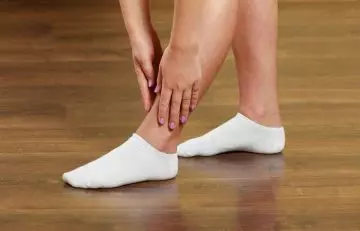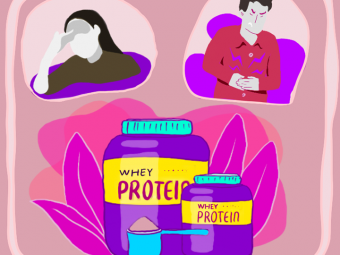5 Signs Your Body Can Give You When You Have High Cholesterol

Image: Shutterstock
After years of half-truths and relentless ads on our TVs, cholesterol has, quite unfortunately, earned itself a bad name. The truth is, it’s good for you! It helps with digestion, making hormones, forming new cells, and absorbing vitamin D.
However, when there’s a surge in your bad cholesterol (LDL) levels because of poor eating, exercising, or lifestyle habits, that’s when it gets tricky. And here’s why:
Cholesterol is a waxy, fatty substance that flows through your blood vessels as lipoproteins (1). Low-density lipoproteins carry “bad” cholesterol. When cholesterol is high (read: hypercholesterolemia), the liver can’t get rid of it all, and they tend to get stuck to the walls along the way, catching more and more lipoproteins as they come. In medical-speak, this is called atherosclerosis. With time, the wall of fat just keeps growing until it blocks the blood flow, and that’s when it becomes life-threatening.
That’s why it’s super important to keep an eye on your symptoms. If your cholesterol levels are way up, these are 5 signs to look out for:
1. Your Chest Hurts
Since the arteries get narrow and blocked, the oxygen in the blood can’t make it to the heart. Your heart then strains itself, trying to pump blood without being able to breathe. Because of this, you’ll have chest pains that tend to get worse with physical activity (2). You may also hurt in the jaw, neck or your back. If the heart doesn’t get oxygen any more, it could cause a heart attack.
2. Your Legs And Arms Hurt Or Feel Weird
Lack of oxygen to your arms and legs causes your muscle cells to cramp leading to mild to agonizing pain, especially at night or after exercising. You may also feel numbness, a burning sensation or tingling, as if you have been sitting on your legs for too long.
If you experience these sensations without any apparent reason, you may have peripheral arterial disease, which can be induced by high cholesterol (3). Watch out for your toes turning pale or blue, and if you’re feeling excessively tired as well.
3. You Feel Dizzy
The brain responds to low oxygen with dizziness, light-headedness, and headaches. You could also feel off-balance and woozy, have blurred vision, and speak all groggily. If blood isn’t reaching your head, you could risk having a stroke.
4. Your Kidney Performance Is Messed Up
If you’re puffy-eyed, have swollen hands or feet, can’t focus on anything, feel like throwing up or are peeing more often, your kidney function might be off. This happens when your renal arteries get clogged, preventing oxygen from reaching your kidneys and allowing them to work properly (4). Doctors call this renal artery stenosis.
You would also have high blood pressure because the body mistakenly believes that your kidneys aren’t getting the blood they need due to low blood pressure. With time and lack of O2, your body would eventually experience kidney failure.
5. Your Breathing Is Difficult
High cholesterol causes shortness of breath. Simply put, you’ll feel like you’ve sprinted up several flights of stairs, even if you’ve just walked to the kitchen. It’s worse with more intense physical activity and much worse if you’ve been smoking. You may also feel overly anxious.
High cholesterol can also be genetic (familial hypercholesterolemia) and it especially rises after you turn 20 (5). It’s also more common in people who are diabetic or overweight. Additionally, look for discoloured patches on your limbs, just under your eyelids and in your eyes. Those with familial hypercholesterolemia may also see lumps under their skin.
Before you leave, you should know that high cholesterol has no direct symptoms. This article is about the symptoms of coronary heart disease, stroke, peripheral arterial disease, and others, which are results of blocked and narrow arteries. Plus, since the described symptoms could also be explained by other problems, high cholesterol is a sneaky condition on its own and could cause problems without being detected. Only a blood test can tell if it needs looking into. Remember, a high total blood cholesterol level is usually more than 240 milligrams per decilitre. But even if your levels are fine, it’s smart to get a blood test done every couple of years and visit your doctor.
So, what should you do if you’ve got high cholesterol? Well, put down the phone for one, and go for a walk. Trash the chips and fried snacks, and opt for a salad instead. Oh and hey, if you think that throwing a quick salad together is too much work, it’s never been more obvious that you need to upgrade your lifestyle. If you would just make a few changes on your plate, and go for a run now and then, not only would you feel good about yourself, but your arteries would be eternally grateful too!




























